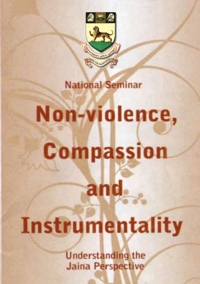Chennai 2009: Non-violence, Compassion and Instrumentality - A Jaina Perspective
 | Non-violence, Compassion and InstrumentalityA Jaina PerspectiveSeminar organized by the Department of Jainology of the University of Madras, 13 and 14 February 2009 Chennai, India |
Relevance of Non-Violence in the Modern Age
13.2.2009
Man: An economic machine?Ahiṁsā is the essence of Dharma. It is what makes the functioning of the society possible. Much more, it is a virtue that nurtures inner reverence for the honor and dignity to all forms of life. Compassion and kindness are really expression of this basic value, which when practiced and reciprocated results in peace and harmony in the world. Violence is deviation from Dharma and hence is the root cause of all evils in society.
The quintessence of Lord Mahāvīra’s teachings is that Dharma is most auspicious and it sustains the universe. Ahiṁsā (non-violence), self-restraint and austerity are the basic expressions and constituents of dharma.[1] The principle of ahiṁsā in Jainism embraces not only human beings but also animals, birds, plants, vegetables and creatures in earth, air and water. It is holy law of compassion extended to body, mind and speech of every living person.
In the words of Lord Mahāvīra, “Not to kill any living being is the foundation of all wisdom. Certainly, one has to understand that non-violence and equality of all living beings are essentials of dharma.”[2] Lord Mahāvīra emphasized reverence to all forms of life and said: “All living beings desire to live, they wish to relish pleasure, they loath misery, shun annihilation; enjoy life and like to live long.”[3] In short, life is dear to all beings. He further said, “Knowing that all the evils and sorrows arise from injury to living beings, and (knowing further) that it leads to unending enmity and hatred, and is the (root) cause of great fear, a wise man, who has become awakened, should refrain from all violent (harmful) activities.”[4]
Today mankind has forgotten the above values of ahiṁsā. The result is that it is suffering from the effects of violence, hatred, disharmony and degradation of all values of life. Let us try to take remedial steps so that mankind leads a life full of harmony and happiness.
A planet in troubleThe modern civilization based entirely on the material, i.e. the economic plane has resulted in the persona of man being cabined into an economic animal. Naturally, it has not helped him attain any measure of real happiness. He has tried several “-isms,” but they have not solved his problems. The same is the fate of the western society dominated by American capitalism. E. F. Schumacher says that America, having just 6 percent of world’s population is using 40 percent of the world’s resources and yet the average level of happiness of the people there has not improved.[5] On the contrary, in that country families are broken up, relationships between husband and wife, between parents and children are snapped. Individuals feel isolated and alienated with the sense of vacuum and boredom oppressing them - there is that growing inner feeling of futility and absurdity. Any number of remedies, like group therapy, drugs, sexual games and all the rest has failed. Educational experts say that children there are more at home with drugs, television, games, etc., than with their parents or their brothers and sisters. In short, considering economic growth alone as the yardstick for measuring standard of life, has verily led to destruction of human personality. It has made man “a clog in the wheel” and destroyed the natural rhythm of his life.
WildlifeFor centuries, the dominant attitude in the western world towards nature was that it existed for the benefit of mankind. According to them man is the supreme animal and all agencies of nature are his subordinates. Man can exploit and use them according to his whims and fancies. Francis Bacon wrote 400 years ago that the world is made up for man, not man for the world. The result of this attitude is that the global economy is expanding amidst an all-round deterioration of the environment today. This deterioration has reached such a high level that it now threatens the very existence of the planet earth. This is resulting in serious damages to nature and environment. Arnold Toynbee wrote in 1972 in the London Observer: “We are suffering from having sold out our souls to the pursuit of maximizing material wealth, a pursuit which is spiritually wrong and practically unattainable.”5 In the recent world we have seen disastrous consequences of degradation of nature and its agencies. We have experienced the chocking air pollution in Mexico, the deadly aftermath of the Chernobyl accident in Ukraine, the destruction of the rain forests in Brazil, the death of Swedish lakes from acid rain, heavy pollution in the mighty rivers like the Ganges and the horror of the chemical disaster in Bhopal. Wherever we look, we see our planet as one in trouble.
Unrestricted hunting of animals for food, fur or fun is threatening the very existence of many species. The share of the birds, mammals, and fish vulnerable or in immediate danger of extinction is now estimated at 11 percent of the world’s 8,615 bird species, 25 percent of the world’s 4,355 mammal species, and 34 percent of all fish species. Smt. Maneka Gandhi, Former Minister for Social Justice and Empowerment, Government of India expressed concern in her millennium message in the following words: “This past century has been the cruelest in history. Science was harnessed to business. Progress was measured by profits. We invented factory farming, battery cages, vivisection, mechanized slaughterhouses, marine parks, whaling and trawling. Billions of animals were slaughtered, mutilated, blinded, beaten and slaved.” According to Greenpeace magazine, the population of African elephants came down drastically from 15 lakhs to just 6 lakhs within a period of 10 years from 1981 to 1990. In October 1989, in an effort to stop the killing of elephants, the convention of International Trade in Endangered Species voted to ban the trading of ivory.
Meat and the environment
Towards the solutionKilling animals for food, fur, leather, ivory, cosmetics and other industrial uses is one of the most environmentally destructive practices taking place on the earth today. The meat industry is linked to deforestation, desertification, water pollution, water shortages, air pollution and soil erosion. Neal D. Barnard, President of Physicians Committee for Responsible Medicine (U.S.A.) says, “If you are a meat eater, you are contributing to the destruction of the environment, whether you know it or not.”[6] Jeremy Rifkin rightly warned in 1992, “Today, millions of Americans, Europeans, and Japanese are consuming countless hamburgers, steaks and roasts, oblivious to the impact their dietary habits are having on the biosphere and the very survivability of life on earth. Every pound of grain-fed flesh is secured at the release of tons of carbon dioxide, nitrous oxide and methane into the skies.”[7] About 40 percent of the land in the western United States is used for grazing beef cattle. About half of the world’s grain is consumed by animals that are later slaughtered for meat. It takes sixteen pounds of grain and soybeans to produce one pound of beef. About 20 vegetarians can be fed on the land that it takes to feed one meat eater.
Reducing or eliminating meat consumption would have substantial positive effects on the environment. Fewer trees would be cut, less soil would be eroded, and desertification would be substantially reduced. Further, eliminating meat eating would release a vast quantity of food grain for human consumption, thus helping solve the world food problem. And on an ethical level, stopping animal killing help to induce a greater respect for all kinds of life.
Lord Mahāvīra said in the Uttaradhyāyana Sūtra, “Where there is inner desire for material gain and possession of worldly objects of enjoyments, there is greed.”[8] This greed results in possessing more and more material objects. There is a clear link between accumulation for its own sake and restlessness. The theory of self-interest for self-promotion lacks human values.
Need for preserving life-valuesSeeing that the world is leading towards environmental catastrophe, violence and hatred in different groups makes one wonder if it is possible to make the life of the people peaceful and harmonious. This requires immediate attention and necessary action on war footing. The teachings of Lord Mahāvīra, though 2500 years old, are relevant even today and provide correct solution to the problems of mankind. The following corrective steps have to be taken:
- Reduction of desires for material objects:
Environmental and other problems cannot be solved unless people reduce their desires for material consumption. As Mahatma Gandhi said, “Nature can fulfill all the needs of mankind but not its greed.” Over-exploitation of natural resources by a small group of wealthy people deprives a large population of their basic needs of materials. Hence, man should make optimum use of the available resources.
- Spiritual basis of the economic system:
Lord Mahāvīra laid emphasis on having control over economic needs and advocated self-restraint in their use. Man is not an economic unit only, but he is basically a spiritual personality. The mechanical worldview advocated by western thinkers has not solved the problems of humanity.Lord Mahāvīra laid great stress on the right attitude, self-discipline and carefulness. He said that a man should continuously watch his own behavior so that it does not result in any injury to any living being. Jaina ethics give great attention to life-preservation, life-protection and kindness to all forms of life. His teachings of non-violence, restricting the desires and giving away in charity, are very much needed to reduced violence, selfishness and degradation of life values.
Today life values are degrading. Man has become self-centered and greedy. The problems faced by humanity are inequality, improper distribution of natural resources, racial discrimination, economic hardships faced by a large population and the hazards of religious and cultural fundamentalism. These can be solved by understanding the true aim of life which is to develop values and not merely enjoyment of more and more material and sensual objects. Today, there is an urgent need to understand and imbibe the life values of non-violence, compassion, restraint of desires, and equality taught by the Great Master more than 2500 years ago.
There is some awakening in the present world and many right-thinking people have started giving attention to life-values to make life of common people healthy, happy and harmonious. The General Assembly of the United Nations proclaimed the year 2000 as the ‘International Year for the Culture of Peace’[9]. Culture is about how we live our lives, how we think, speak and behave. On 9 December 2000, the Prime Minister of India signed the UNESCO Manifesto 2000, propagating six core values for a culture of peace and non-violence. The Manifesto, drafted by a group of Noble Peace Prize laureates, solicits support from people across the globe to practice values like:
- Respect for life
- Rejection of violence
- Share and care
- Listen to understand
- Preserve the planet
- Rediscover solidarity
The above manifesto is based on the principles of non-violence (reverence for all forms of life), non-possession, and values of life. There is great need today to imbibe the above teachings so that they become a part of our day-to-day life. These teachings will inspire every person to lead a happy, peaceful and humanitarian life.
 Dulichand Jain
Dulichand Jain
